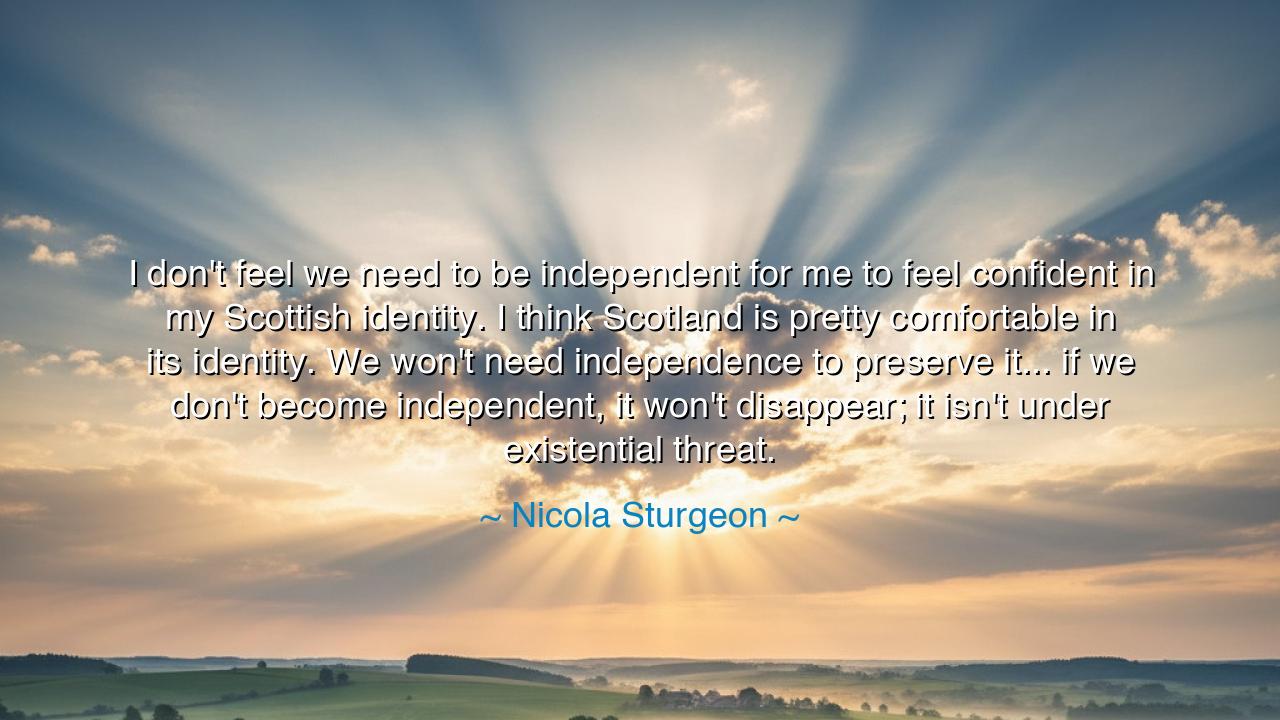
I don't feel we need to be independent for me to feel confident
I don't feel we need to be independent for me to feel confident in my Scottish identity. I think Scotland is pretty comfortable in its identity. We won't need independence to preserve it... if we don't become independent, it won't disappear; it isn't under existential threat.






Listen, O children of the future, and hear the words of Nicola Sturgeon, a voice that speaks not only to the present, but to the very soul of identity and belonging. She says, "I don't feel we need to be independent for me to feel confident in my Scottish identity. I think Scotland is pretty comfortable in its identity. We won't need independence to preserve it... if we don't become independent, it won't disappear; it isn't under existential threat." These words reflect a wisdom that transcends the temporary tides of politics and reminds us that identity is not merely a product of borders or political status, but something far deeper, something that cannot be shaken by external forces.
The notion of independence has long been revered as a symbol of strength and self-determination. In the annals of history, many peoples have fought for their freedom—the Greeks against the Persians, the Americans against the British, and the Irish against centuries of domination. But Sturgeon reminds us that identity does not depend solely on the act of independence; it is not a fragile thing that crumbles when borders shift or political systems change. Scotland, she says, is already strong in its identity, already certain of its place in the world. True identity is not determined by political boundaries but by the values, traditions, and spirit of a people.
Consider the story of Athens in the ancient world, a city-state renowned not for its territorial control, but for the strength of its identity as the birthplace of democracy and philosophy. Athens fought wars, yes, but its true power lay not in its ability to expand or claim territory, but in the unwavering confidence it had in its unique way of life. It was this sense of identity that allowed it to endure through times of struggle. Even after its defeat in the Peloponnesian War, the Athenian spirit did not vanish. Athens remained the heart of learning, culture, and ideas, a symbol of the power of a people to thrive even when faced with political changes or external threats.
Nicola Sturgeon’s words echo this wisdom. Scotland's identity is not something that can be lost or erased by the absence of independence. It is not fragile or under threat, but resilient and rooted in the hearts of the Scottish people. Like the Athenians, the Scots have a long and proud tradition of cultural and intellectual contribution to the world, one that transcends the narrow limits of political sovereignty. Whether or not Scotland becomes an independent nation, its identity is secure, its place in the world firmly established by the actions and contributions of its people.
However, Sturgeon also acknowledges a deeper truth—that independence, while powerful, is not the only path to preserving identity. The history of the world is filled with examples of nations and peoples who, though not politically independent, maintained a strong sense of self. Consider the Jews who, for thousands of years, wandered as exiles and minorities, yet never lost their identity. They carried their culture, their language, and their values with them across continents, through centuries of displacement. The strength of their identity was not tied to the land they occupied, but to the unbreakable bond they shared as a people, a bond forged in the spirit of tradition and faith.
From this, O children, we can learn a vital lesson: identity is not a fragile thing, dependent on the shifting sands of politics or geography. It is born from the inner strength of a people, from their values, their culture, and the stories they tell about who they are. Independence is a powerful force, but it is not the sole protector of identity. A people can remain strong and true to themselves even when they do not stand alone. Scotland, like many nations throughout history, has shown that identity is a living, breathing thing that cannot be taken away by outside forces.
Take this wisdom into your own life, O children: remember that identity is not something granted to you by borders or governments; it is something you carry within you, something that endures through the trials and tribulations of life. You are defined not by the flags that wave above you, but by the values you uphold, the culture you cherish, and the spirit with which you face the world. Whether or not you walk in independence, your identity is yours to shape, yours to preserve. Let no external force tell you who you are or what you must become. Stand firm in your own truth, and know that your identity is eternal.






AAdministratorAdministrator
Welcome, honored guests. Please leave a comment, we will respond soon